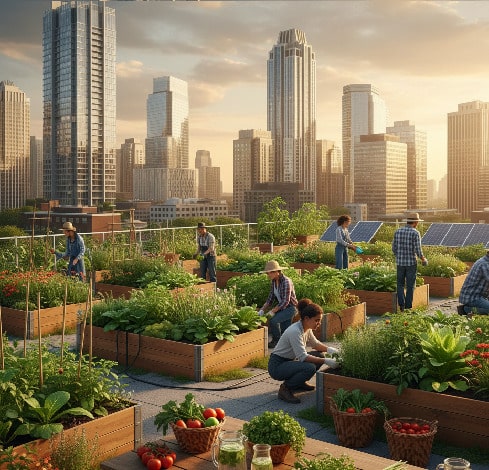On Jeju Island, Jeju entertainment establishments (제주 유흥주점) provide visitors with relaxing places for leisure, ranging from karaoke rooms to cafés and salons. These locations showcase how local culture merges enjoyment with relaxation, attracting both tourists and locals. They also represent how communities organize spaces around shared activities, shaping the character of the city itself. In the same manner, urban spaces worldwide are being reshaped by the rise of urban gardening and local food initiatives, which are offering eco-friendly solutions to modern challenges.
Reimagining City Landscapes through Gardens
Urban gardening is reshaping city landscapes by transforming rooftops, vacant lots, and small community areas into thriving green spaces. The appeal of crowded urban environments were elevated by the natural beauty brought by these gardens. Besides playing a critical part in addressing food insecurity, it provides residents with direct access to fresh, locally grown produce.
Cities that once relied heavily on imports are now discovering the benefits of cultivating food within their own boundaries, reducing transportation costs and carbon emissions.
As a result, urban farming and rooftop gardening are slowly becoming a sustainable solution. More and more people are starting to see the improvement in food resilience.
The best part, it makes city life healthier and greener.
Jeju Entertainment Establishments and Community Bonds

Much like entertainment venues that bring people together, urban gardens serve as powerful spaces for community engagement and collaboration. Neighbors often work side by side in planting, maintaining, and harvesting crops, which strengthens social bonds and creates a sense of shared responsibility.
These green spaces transform neglected areas into productive community hubs. Areas that were converted into gardens not only improve access to fresh, and healthy food. It sets the ground for promoting teamwork, cultural exchange, and environmental awareness. As a result, community gardening initiatives enhance both food security and social cohesion, making cities more resilient and connected.
Environmental Impact of Local Food Systems
Reducing reliance on long-distance food transportation significantly lowers carbon emissions, making urban gardening a sustainable solution for modern cities. Locally grown produce not only arrives fresher but also requires fewer preservatives, ensuring healthier food for residents.
Beyond the environmental and health benefits, urban gardens enhance biodiversity by creating micro-habitats for pollinators such as bees and butterflies. These thriving green pockets support ecological balance within city landscapes, proving that small-scale gardening can have large-scale environmental impact.
Scaling Sustainable Practices
While individual urban gardens may seem symbolic at first glance, their collective influence is truly transformative. Across major cities, the adoption of green roofs, community farms, and large-scale sustainability programs are turning small local efforts into powerful solutions for climate resilience.
These initiatives not only reduce urban heat and improve air quality but also strengthen food security in dense populations. When paired with educational programs, urban gardening empowers future generations. They are likely to learn practical agricultural skills, environmental awareness, and community values. Through this, it increases the odds of the younger generations to inherit healthier ecosystems and more connected neighborhoods.

